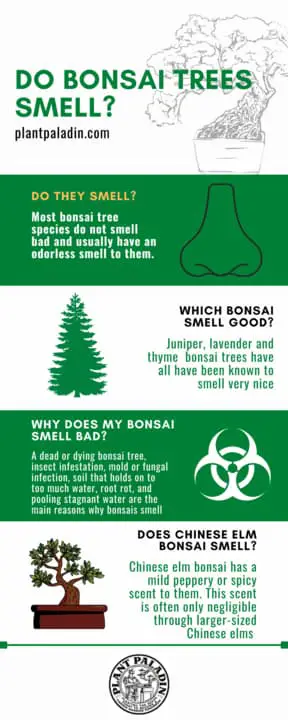This website is supported by its readers. If you click one of my links I may earn a commission. I am also a participant in the Amazon affiliates program and I will also earn a commission from qualified purchases.
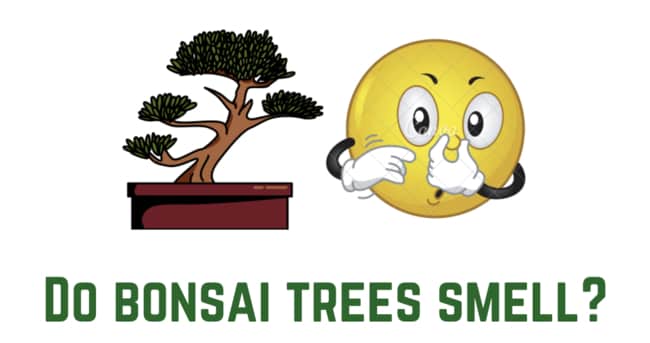
One of the things I was worried about when I first started my bonsai journey was if bonsai trees smelled. After all, I was living in a small apartment at the time, and the last thing I wanted was to do was invest in bonsai trees if it was going to stink up my living area. So do bonsai trees smell?
Bonsai trees should not smell bad. Most bonsai tree species are odorless or have mild smells. Should your bonsai tree smell foul, it could be a sign that your bonsai tree is dying, has poor soil quality, has too much moisture, has a fungal infection, or an insect infestation.
So what should you do if you feel your bonsai tree smells? And are there any bonsai species that are pleasant to smell? Keep reading to find out more!
Just a quick heads up, over the past three years of running Plantpaladin, hundreds of people have asked for product recommendations. As such, You can find my favorite indoor bonsai tree here (link takes you to Bonsaiboy), my favorite outdoor bonsai tree (link takes you to Bonsaiboy), or have a look at all the products I recommend here.
Do bonsai trees smell?
So the other day I had to pop over to my local grocery store.
Now I live in quite a grassy area and was surprised just how much the plants and trees, contributed to the bad smell on the way.
That got me thinking if larger trees and plants can contribute towards a foul smell, do miniature trees like bonsai, also emit a smell.
I wanted to find out, so after visiting a few garden centers, inspecting my own bonsai, speaking to a few experts, and polling a few of our plant paladin readers here are the results.
- Most bonsai tree species do not smell bad and usually have an odorless smell to them.
- Bonsai trees that do emit a smell are usually mild in nature
- This is because they are natural meaning they won’t contribute to smells if kept healthy.
- There have even been some examples of bonsai trees and other house plants purifying the air, helping to remove bad smells from houses.
- Some plant species commonly used for bonsai such as gardenia, juniper, and lavender or thyme have been known to have beautiful scents so can actively contribute towards a positive atmosphere.
- Should your bonsai tree have a foul smell then It is a surefire sign that your bonsai is dying, has a fungal or mold infection, is fighting an insect infestation, has poor soil drainage, has root rot, or has pooled water, which is contributing towards the stench.
Why does my bonsai tree smell?
A dead or dying bonsai tree, insect infestation, mold or fungal infection, soil that holds on to too much water, root rot, and pooling stagnant water are the main reasons why bonsai trees smell. You should regularly inspect your tree for these symptoms to avoid a bad smell developing.
Now each of these is very different elements we need to deal with so let’s explore them in more detail down below:
Dying bonsai trees can cause bonsai to smell
Easily the biggest contributor that I have heard from my readers and other bonsai owners that their bonsai trees smell bad, is because their trees are dying.
You see the decomposition process affects all living things, and bonsai trees are no different.
Now depending on the amount of nitrogen, moisture levels, or amount of aeration in and around your plant will indicate just how bad your bonsai will smell when it is dying or decomposed.
If the levels are right then the smell will be mildly bad, but should your bonsai nutritional levels be all over the place, then it is not unheard of for bonsai to smell like sulfur or rotten eggs.
How to avoid it?
To avoid your plant from dying, drastic action will need to be taken to prevent the death of your bonsai.
Usually, bonsai trees that are dying will have several symptoms such as:
- Leaves that are falling off
- Leaves turning yellow
- Shrivvleved up branches
- White spots or brown edges to your leaves.
All of which are caused by the amount of soil, light, and water your bonsai gets.
As such try to maintain a regular schedule which:
- Waters your bonsai regularly – check at least once per day for dry soil
- Ensure your bonsai tree girls enough light (at least 4 hours of direct sunlight per day-especially during the summer months)
- Ensure the soil for your bonsai allows for aeration and moisture but also allows for water to flow through easily.
Should your bonsai tree be too far gone then you might want to visit a specialist bonsai doctor such as Herons Bonsai to help revive your bonsai.
Insect Infestation can cause bonsai to smell
At some point, sooner or later, bonsai owners have to deal with insect infestation.
This can range from everything from aphids and spider mites to scale and whiteflies.
One common reason why your bonsai tree might have started smelling all of a sudden is the influx of insects and their eggs in your tree.
Now insects will smell differently spending on the type of bug but hopefully, the graph below will help:
Common bonsai insects and what they smell like
| Insect | Type of smell |
| Cockroach | Oily odor like fecal soy sauce. |
| Aphids | Sweet smell, usually caused by them eating the sap of your tree. |
| Ants | Citronella like the smell (also knowns to smell like blue cheese). |
| Spider mites | Sweet smell, usually caused by them eating the sap of your tree. |
| Scale | Sweet smell, usually caused by them eating the sap of your tree. |
Now on top of these smells, insects such as scale or aphids will literally eat and such your bonsai tree, causing your bonsai to become more stressed and eventually start to decompose – laying out a lot of the smells we talked about above.
How to avoid insect infestation?
For most insect infestation, they can be removed in one of the following ways:
- Using a mix of one tablespoon of liquid soap with 30oz of water and spraying the bonsai tree
- Using a good natural insecticide
- Blasting your tree with water
- Manually removing the bugs
Mold or fungal infections can cause bonsai to smell
Mold and fungal infections usually work hand in hand and often when you get one, you get another.
Fungal infections can usually be spotted through white spots or white powder on the leaves of your bonsai.
Mold infections usually start in the topsoil of your tree and work their way up the trunk of your bonsai.
Now both can usually be easily treated either with a fungicide or by repotting and replating your tree and removing any moist soil.
They do however usually have a pretty bad smell as the fungal/mold infection starts to infect the roots of your bonsai – causing root rot and starting to decompose your plant.
How to avoid bonsai fungal infection?
As mentioned above, using a good fungicide is the best way to remove a fungal infection from your tree.
For a mold infection, this will take slightly more work but the best thing to do would be to repot and replant your bonsai tree.
You can also try drying out the roots and the plant overall with a hot air dryer.
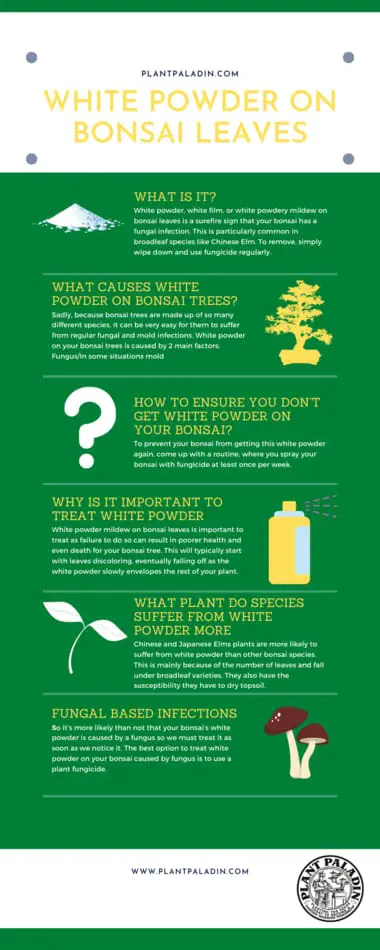
Root rot can cause bonsai to smell
Root rot is also incredibly common in bonsai trees and another major reason for them to smell.
You see because we keep bonsai trees in pots, it means that roots can’t grow freely in the ground as they would for other plants.
As such, it’s easy for the roots to get overcrowded, and start competing for air and moisture.
It’s one of the reasons why we look to root prune our bonsai and repot our bonsai regularly.
New roots and root rot
When we prune the roots of our bonsai, after about a year, new roots will have started to develop.
These new roots don’t have the ability to absorb dry or wet conditions particularly well and so are more susceptible to start to rot.
As the roots start to rot, bacteria start to decompose the roots spoiling them.
This releases gasses such as sulfur dioxide and ammonia to get released – both of which are notorious for foul smells.
How to avoid root rot
To avoid smells coming from root rot, you need to remove the root rot.
To do this:
- Remove the plant from your pot
- Trim and remove the roots from the soil
- Trim and cut back the rotten roots of your bonsai
- Replant your bonsai in a new pot with a good soil mix
- Ensure you was your old pot to remove any excess bacteria or mold
Poor soil quality can cause bonsai to smell
Bonsai soil mix is incredibly important when it comes to keeping bonsai.
As bonsai are not planted in the ground typically, they have to get all the nutrients and minerals they require from a soil mix.
Now the soil mix has to:
- Pass water through easily
- Hold on to enough water to water your bonsai
- Have enough room for aeration so your roots do not drown or dry out.
This can be a tough balance to follow and is one of the reasons why I like to use volcanic or cactus soil – both of which are usually PH neutural and don’t have any real side effects.
Having too much water in your soil then is usually the reason why your bonsai soil can start to smell
Whilst most store-bought soil mixes should work fine for your bonsai and not emit any smell.
If you have got a bad batch of soil, or are reusing a soil mix that does not allow your tree the right balance, of moisture, aeration, and water then your bonsai will start to smell as things like root rot and decomposition start to set in.
How to know if you have bad soil?
Now figuring out if you have too much water in your bonsai soil mix that is causing the smell should be fairly straightforward.
To determine this we need to do the following:
- Smell the bonsai – Should we get a raw, sewage smell, then we know our soil has too much water
- Keep an eye out for moss – Moss and algae, slike sphagnum moss, are commonly used in bonsai. If however, you have to manually put any moss on your tree then this could be a sign you have too much moisture in your soil
- The topsoil is constantly wet – Touching the topsoil of your bonsai allows you to know whether to water your bonsai. If it has been a few days since you last watered your bonsai and you find the topsoil is still wet or moist to the touch, then you have too much water in the soil.
- Muddy soil – If you touch the bottom of your soil and you realize that it is relatively wet to the touch then again, it’s another sign your soil has gone bad, has too much water in it, and is causing the foul smell
How to stop your soil from spoiling
So if you have determined that it is the poor soil that is caused the stagnant smell for our bonsai tree then the best option would be to:
- Invest in a new soil mix (again volcanic ash or cactus soil work best for me)
- Ensure your plant pot has enough drainage holes to aid in the drainage of your bonsai.
- Repot your bonsai in a new soil
- Read up my post on overwatering bonsai – This will give you loads of hints on how to counteract bonsai soil or a bonsai tree that has too much water in it.
Pooling water can cause a bonsai tree to smell
Anyone who owns a washing machine knows now and then pooling water can make a machine stink.
The same goes for bonsai trees.
As discussed above, poor soil content can often lead to overwatering of your bonsai tree and water to pool.
If water is not filtered out from the soil of your bonsai correctly, it can pool into places leaving a damp smell that can cause serious problems later on – such as root rot or mold infections.
This pooling water is also a risk to the overall health of your tree causing waterborne bacterial infections so it’s super important you try to stop water pooling in bonsai as soon as possible.
How to avoid water pooling
Water pooling usually occurs when there are excessive air pockets in your soil mix.
As such, use a metal pole (chopsticks work well for this) and push the solid in these air holes.
Then fill up any gaps with the soil mix.
It’s also very important that you invest in a bonsai pot that has enough drainage holes for the size of your tree.
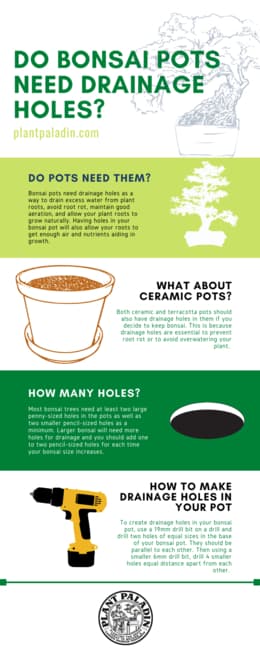
Hopefully, the graph below should help determine the number of holes to determine the maximum balance of aeration and moisture – you may also however want to read this post around bonsai size classification to further expand on the size of your tree.
| Classification | Size inches | Number of penny-sized holes | Number of pencil-sized holes |
| Keshitsubo | 1 to 3 inches | 1-2 | 0 |
| Shito | 2 to 4 inches | 1-2 | 0 |
| Mame | 2 to 6 inches | 2 | 2 |
| Chohin | 5 to 8 inches | 2 | 2 |
| Kumono | 6 to 10 inches | 2 | 2 |
| Katade-mochi | 10 to 18 inches | 2 | 3 |
| Chiu or Chumono | 16 to 36 inches | 2 | 4 |
| Dai or Omono | 30 to 48 inches | 3 | 6 |
| Hachi-uye | 40 to 60 inches | 4 | 8 |
| Imperial | 60 to 80 inches | 6 | 8 |
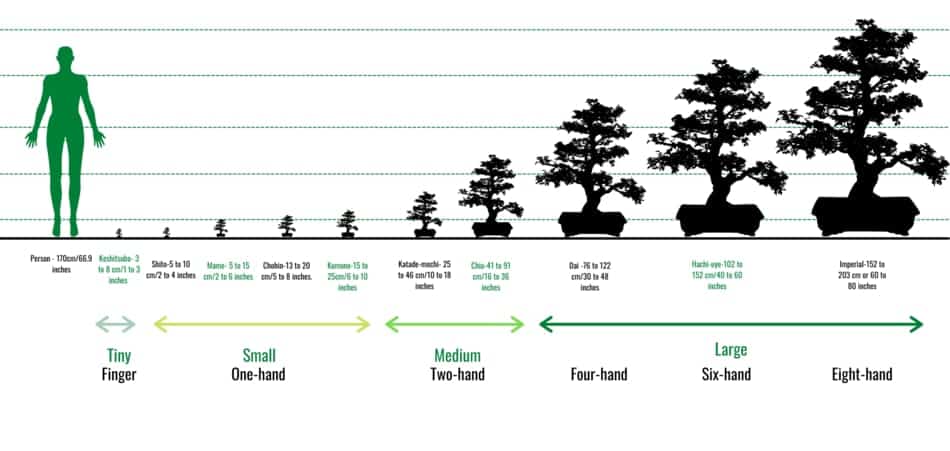
What to do if your bonsai tree smells?
Should your bonsai tree smell bad you need to identify the root cause of the smell. Water pooling, poor soil mix, fungal infections, and root rot are all common reasons why bonsai trees can smell. Once identifies you can then counter the cause and remove the smell from your tree.
Now aside from the methods laid out above and through this post, if your bonsai tree is still smelling and it is not because of any of the methods laid out, what are some other quick tips you can do to help remove any excess smell.
Let’s explore these below
Clean your bonsai nursery
Sometimes it’s not the bonsai trees that smell, but the benches, pots, or living spaces we keep our bonsai in.
If you keep your bonsai indoors or in a greenhouse or cold frame, ask yourself when the last time you cleaned that.
Should your bonsai be kept outdoors then the smell could be coming from the shelves or units you keep your bonsai on.
Keep a regular cleaning schedule and see if the smell dissipates.
Move your bonsai near other bonsai
One of the fantastic things about all plants is they have the unique ability to absorb the smells around them.
Think of them as mini natural air freshness.
If you find then that one of your bonsai, in particular, smells bad, observe its surroundings.
If no other plants are near it, then a trick you can follow is to put the bonsai next to the rest of your plants to absorb the smell.
After a few days have a check and you might find the smell will have dissipated.
Invest in scent boosters
A little trick I found to help boost the scent of the clothes in my wardrobe was to invest in scent boosters
These little sheets pack a punch and release a flow of nice smelling scents into nearby items
Should your bonsai tree smell then keep a scent booster nearby your plant and watch the small slowly disintegrate.
Opt for a better-smelling species
Finally, you might have just got unlucky and invested in a bonsai tree that naturally smells pretty poor.
You see bonsai trees are not made up of one species of plant but thousands and so some will smell better than others.
Most species used for bonsai won’t smell at all but some such as Bradford pears – whilst quite rare in bonsai use – do have a foul smell when their flowers start to bloom.
Instead, opt for trees or plants used in bonsai that have a naturally nice smell to them such as Lavender, Thyme, or Juniper.
Now if you have invested in one of the above species, just remember that smell is subjective – just because other people might like the smell of those plants you might not.
Why does my bonsai tree smell good?
If your bonsai tree smells good, it is because you have invested in a species with a good scent. Juniper, Lavender, Cedar, and Sequoia all have historically pleasing smells. Ensure you maintain their health to continue the pleasing smell.
So which bonsai trees species typically smell the best? These usually include:
- Juniper
- Lavender
- Sequoia
- Cedar
- Hemlock
- Firs
- Rosemary
- Thyme
- Lemon
- Lime
- Orange
- Jasmine
- Wisteria
- Honeysuckle
- Lilac
- Gardenia
- Koreas SPice Viburnum
- Silk Tree
Conifers like junipers, herbs like lavender, or citrus species such as orange are best if you would like a nice smelling bonsai tree year-round.
If however, you would like a bonsai that smells good during the spring and summer only, then opt for a flowering species like the silk tree.
Common bonsai species and smell
So what about the most common bonsai species? After all Chinese elms, Junipers, Ficus, and Jade are all amongst the best-selling bonsai species – so do these bonsai trees smell?
Luckily I’ve put together a table below which should help:
| Bonsai species | Does it smell |
| Chinese Elm | Yes, Chinese elms have a mild peppery/spicey odor to no odor. |
| Juniper | Yes, Juniper has a moderate cedar evergreen smell. |
| Jade | Yes, Jade plants have a very mild soap-like small. |
| Ficus | No, If a ficus does have a smell it will be a mild plant-like smell |
Does Chinese elm bonsai smell?
Chinese elm bonsai has a mild peppery or spicy scent to them. This scent is often only negligible through larger-sized Chinese elms and if you are up close with the plant. Most Chinese elms however will often be thought of as odorless as the scent is mild.
Does juniper bonsai smell?
Juniper bonsai has a pleasant cedar, evergreen scent to them. This scent is moderate in nature and should be able to be detected if you’re in the same room as the bonsai. The scent of the juniper bonsai is often prized as one of its biggest selling points.
Does jade bonsai smell?
Jade bonsai has a mild soap-like smell to the leaves. This scent however is mild and can only be detected in the leaves of the plant. It will also be more potent in larger-sized bonsai with small and fingertip-sized bonsai usually not being detected.
Does ficus bonsai smell?
Ficus bonsai does not have any recognizable scent to them. The scent of a ficus bonsai tree is mild in nature and simply smells like the leaves of any regular plant only when up close. Should you leave ficus bonsai in a room, you will not be able to notice the smell of the ficus.
What do the experts say?
Now I visited my local botanical gardens and asked them if bonsai thee smell, this was their response;
“Most bonsai trees will have a mild neutral smell, depending on their species. Some bonsai that are smaller might not have any smell but there is usually a mild smell or no smell. If your bonsai has a bad smell then you might want to look into that”
I also asked 20 plant paladin readers if their bonsai smell and here were your results:
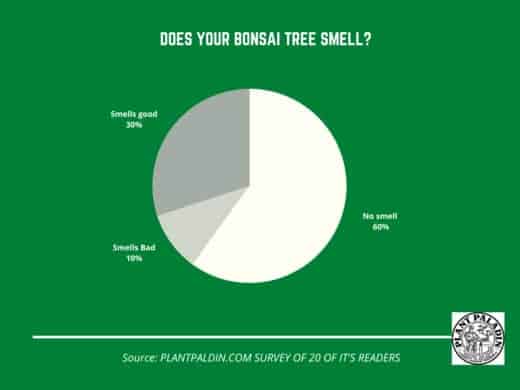
My top picks for the gear you will need!
So like I mentioned earlier, over the past three years of running PlantPaladin, hundreds of people have asked me for my recommendations on the best bonsai gear on the market.
Having spent thousands of dollars on bonsai items these past few years and tested at least 100 bonsai-specific products, I’ve listed my favorite products below – All of which I highly recommend and think you can get great value.
They can purchase directly by clicking the link to take them to Amazon.
Bonsai Tool Set: One of the significant challenges I’ve had is finding a toolset that was not only durable but didn’t break the bank. SOLIGT has recently developed a fantastic bonsai tool set that covers all the tools you need to trim, prune, and repot your trees. – You can grab it here.
Complete Bonsai Set: Many of you will want to grow your bonsai trees entirely from scratch, but finding the varicose seeds, pots, and other items in one place can be challenging. Leaves and Sole then have created a complete bonsai set that I’ve personally used that ticks all the boxes. You can grab it here.
Bonsai wire: The number of times I’ve run out of wire for my bonsai or purchased cheap bonsai wire that doesn’t do the job is embarrassing for me to admit. After a lot of trial and error, I found that using Hotop’s aluminum bonsai wire is one of the best options on the market. This can easily be used for both indoor and outdoor bonsai. You can grab it here.
This post was written by Fehed Nicass who has been passionate about bonsai for over 2 years.

